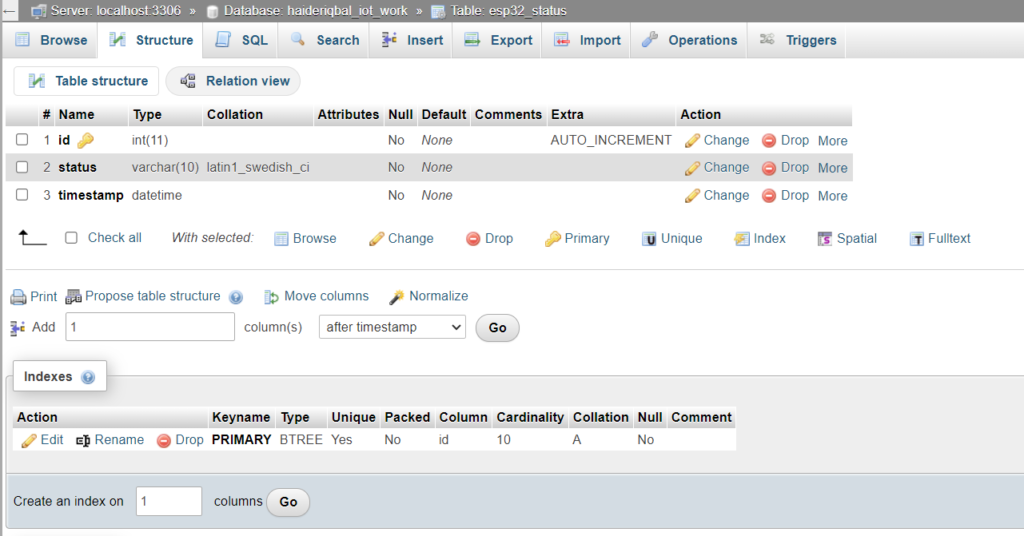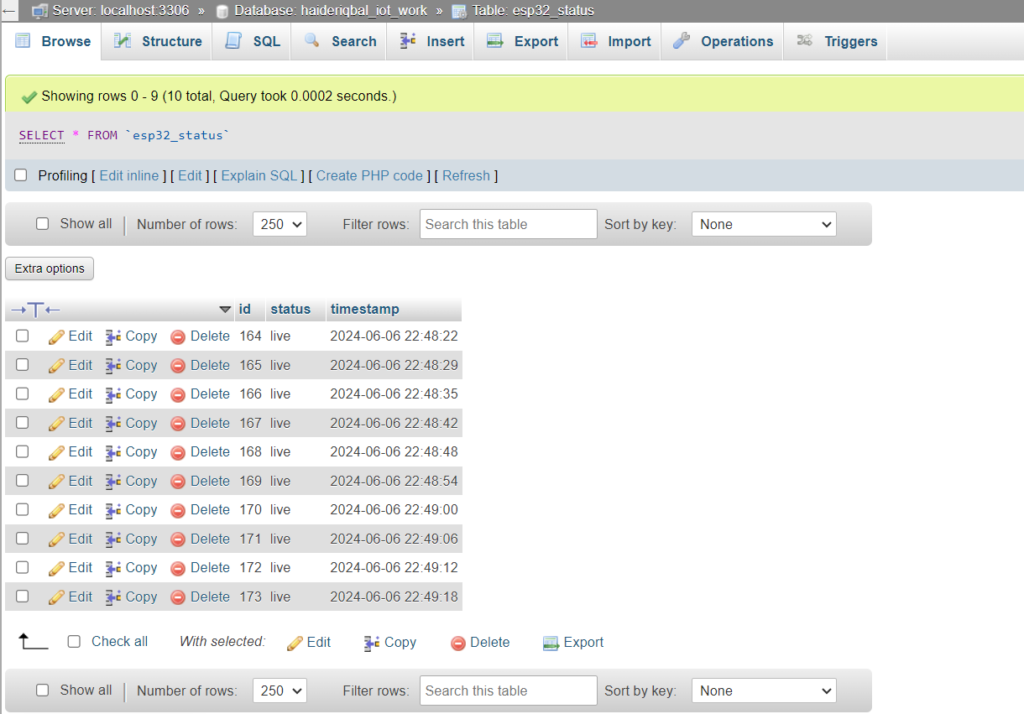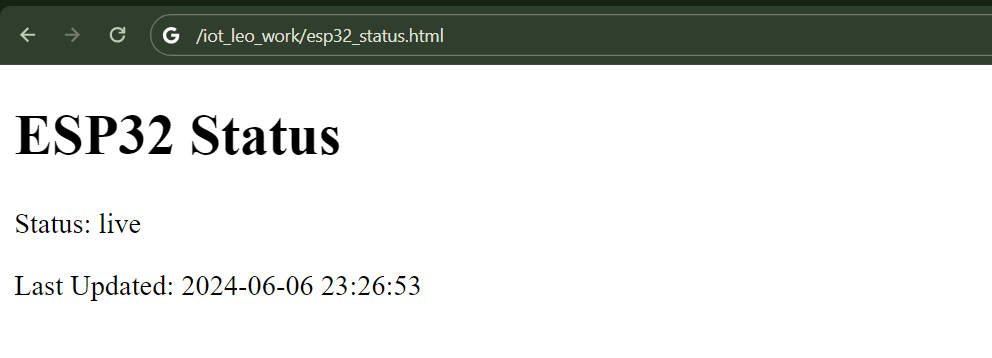Implementing a Status Check:
- ESP32 Setup: Program your ESP32 to periodically send its status to your server. This can be done using HTTP requests to a PHP script on your server.
- PHP Script: Create a PHP script to handle incoming status updates and store them in your MySQL database.
- HTML and JavaScript: Update your HTML page to display the status of the ESP32 by fetching the latest status from the server.
Step-by-Step Implementation:
ESP32 uC Code
#include <WiFi.h>
#include <HTTPClient.h>
// Replace with your network credentials
const char* ssid = "your_SSID";
const char* password = "your_PASSWORD";
// Server URL
const char* serverURL = "http://yourdomain.com/update_status.php";
void setup() {
Serial.begin(115200);
WiFi.begin(ssid, password);
while (WiFi.status() != WL_CONNECTED) {
delay(1000);
Serial.println("Connecting to WiFi...");
}
Serial.println("Connected to WiFi");
}
void loop() {
if(WiFi.status() == WL_CONNECTED){
HTTPClient http;
http.begin(serverURL);
// Send a POST request
http.addHeader("Content-Type", "application/x-www-form-urlencoded");
int httpResponseCode = http.POST("status=live");
if(httpResponseCode > 0){
String response = http.getString();
Serial.println(httpResponseCode);
Serial.println(response);
} else {
Serial.println("Error in sending request");
}
http.end();
} else {
Serial.println("Disconnected from WiFi");
}
delay(10000); // Send status every 10 seconds
}
PHP Script (update_status.php)
<?php
$servername = "localhost";
$username = "your_db_username";
$password = "your_db_password";
$dbname = "your_db_name";
// Create connection
$conn = new mysqli($servername, $username, $password, $dbname);
// Check connection
if ($conn->connect_error) {
die("Connection failed: " . $conn->connect_error);
}
if ($_SERVER["REQUEST_METHOD"] == "POST") {
$status = $_POST['status'];
$timestamp = date('Y-m-d H:i:s');
$sql = "INSERT INTO esp32_status (status, timestamp) VALUES ('$status', '$timestamp')";
if ($conn->query($sql) === TRUE) {
echo "Status updated successfully";
} else {
echo "Error: " . $sql . "<br>" . $conn->error;
}
}
$conn->close();
?>
MySQL Database
- Create a Table: In your database, create a table to store the ESP32 status.
CREATE TABLE esp32_status (
id INT AUTO_INCREMENT PRIMARY KEY,
status VARCHAR(10) NOT NULL,
timestamp DATETIME NOT NULL
);

HTML and JavaScript
<!DOCTYPE html>
<html>
<head>
<title>ESP32 Status</title>
<script>
async function fetchStatus() {
try {
const response = await fetch('fetch_status.php');
const data = await response.json();
document.getElementById('status').innerText = data.status;
document.getElementById('timestamp').innerText = data.timestamp;
} catch (error) {
console.error('Error fetching status:', error);
}
}
setInterval(fetchStatus, 5000); // Fetch status every 5 seconds
</script>
</head>
<body>
<h1>ESP32 Status</h1>
<p>Status: <span id="status"></span></p>
<p>Last Updated: <span id="timestamp"></span></p>
</body>
</html>
PHP Script to Fetch Status (fetch_status.php)
<?php
$servername = "localhost";
$username = "your_db_username";
$password = "your_db_password";
$dbname = "your_db_name";
// Create connection
$conn = new mysqli($servername, $username, $password, $dbname);
// Check connection
if ($conn->connect_error) {
die("Connection failed: " . $conn->connect_error);
}
$sql = "SELECT status, timestamp FROM esp32_status ORDER BY id DESC LIMIT 1";
$result = $conn->query($sql);
if ($result->num_rows > 0) {
$row = $result->fetch_assoc();
echo json_encode($row);
} else {
echo json_encode(["status" => "unknown", "timestamp" => ""]);
}
$conn->close();
?>
Database Structure

Real Time Table data

HTML Live Preview

Further Learning and Improvements
- Security: Implement security measures such as HTTPS and sanitizing inputs to prevent SQL injection.
- Error Handling: Enhance error handling both on the ESP32 and server-side scripts.
- Authentication: Add user authentication to control access to the status page.
- Notifications: Implement notifications (e.g., email or SMS) if the ESP32 goes offline.
- Graphical Data Representation: Use charts or graphs to visualize the status data over time.
By following these steps, you can monitor the status of your ESP32 and enhance your project’s functionality.
